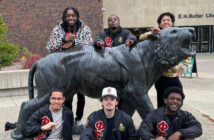Attending a school dominated by Greek life can be overwhelming for me at times, but also the best commitment I’ve made. It’s difficult to imagine life as a non-affiliated student at a school like Lehigh. Nightlife, socials and even darties (day parties) are primarily confined to the Greeks.

Danielle Campbell
Is this because the Greek system has lost its values and over time has come to just be about partying? Or is it because of Lehigh’s size?
It wasn’t until recently that I realized Greek life has always been this way. We always hear people say, “So much has changed! It has lost its value.”
Naturally, I jumped on the bandwagon and played along with that statement, believing everything I heard. After discussing the problems associated with Greek life here at Lehigh with friends and alumni at other universities, I came to the realization that it’s not just our school. It’s everywhere.
Another thing I discovered during my conversations and research is that the Greek system hasn’t lost its values, but rather the school size tends to dictate how Greek life operates at different colleges. Through my conversations, I realized most of the issues are confined to smaller schools like ours, as we don’t have many other options for nightlife besides partying in frat basements. Larger schools have the opportunity to enjoy the metropolitan area, hit up the plethora of bars and hang out at various restaurants.
Many people, then and now, and regardless of size, join Greek life for the leadership experience, social aspects, networking, friendship and the sisterhood or brotherhood. With so many reasons to join, fraternities and sororities become groups of diverse people who hold similar values and desires.
My dad and mom both joined Greek life at a small school in Michigan where 80 percent of the student body was Greek, with only three sororities and six fraternities on campus. Obviously, Greek life dominated the social scene at that college. One of my best friend’s dads was a part of Greek life at Lehigh in the mid ’80s. To my surprise, his experience mirrored mine and many others’ experiences here: a constant mix of brotherhood or sisterhood and parties — fostering an exclusive community from those who are non-Greeks.
On the other hand, my brother, who attends the University of Michigan with a population of around 26,000 undergrads, is a part of Greek life there. His opinions differ slightly from mine, which I believe is because of the school size.
Twenty percent of University of Michigan is Greek. Because of the 80 percent that aren’t, there is so much to do outside of Greek life: visiting the town of Ann Arbor, hanging out at the more than 30 bars and many other social opportunities for non-Greeks. Many non-Greeks throw their own parties at U of M, for example.
Because of the surrounding town and large population of non-Greeks, the Greek system doesn’t dominate the social scene, nor does it seem to exclude those who aren’t a part of it. Although Greek parties may be confined to Greeks, because of the many other options, Greek life doesn’t come across as exclusive.
I used to think so much has changed from the past. I am a believer in strong sisterhood, networking, leadership and lifelong friends. Because Lehigh is one of the top party schools in America, I believe that overshadows a lot of the value of Greek life, or at least the perception. Yes, there are plenty of parties to go around, but at the end of the day, the sisterhood is what matters.
After talking with my family and my friend’s dad, I realized that it’s the school size that depicts how Greek life operates. There hasn’t necessarily been a downfall in the value of the system as a whole, contrary to what many may think.
Just because I appreciate the group that I am a part of doesn’t diminish the fact that here at Lehigh, our Greek system excludes almost everyone who is not a part of it.
Exclusion is the biggest concern I have for our Greek system, but upon realizing that it’s not due to a degradation in Greek system values, but rather the school size, made me believe in why I became a part of it.
The struggle to adjust was worth the friends, leadership and networks that I have access to now, but I also appreciate the decision many of my friends have made not to be apart of the Greek system.
—
Danielle Campbell, ’18, is an assistant visuals editor for The Brown and White. She can be reached at [email protected].





Comment policy
Comments posted to The Brown and White website are reviewed by a moderator before being approved. Incendiary speech or harassing language, including comments targeted at individuals, may be deemed unacceptable and not published. Spam and other soliciting will also be declined.
The Brown and White also reserves the right to not publish entirely anonymous comments.